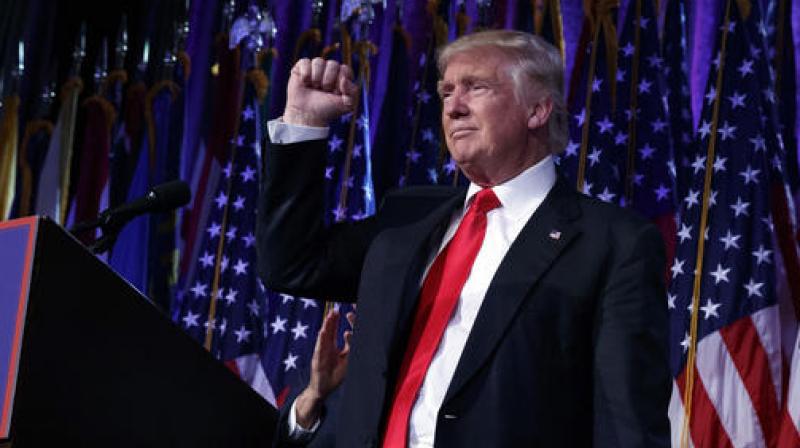Trump's Great Game East

Real estate billionaire and TV mogul Donald Trump is US President-elect, ending a gaffe-ridden, often misogynistic and divisive campaign that seemed as if it would only help his rival Hillary Clinton blast her way through the glass ceiling to become America’s first woman President. That wasn’t to be.
As the world’s most powerful nation comes to terms with the arrival on the political scene of a rank outsider, Mr Trump’s focus will, naturally and primarily, turn inward.
Topping his domestic to-do list will be repealing an unpopular healthcare programme, Obamacare, revitalising the economy and creating more jobs by rebuilding roads, highways, airports, schools and hospitals, as he promised once again in his victory speech on Wednesday.
The bigger challenge ahead will be how he can reconcile the hopes and aspirations and the feeding frenzy he has whipped up among his white-supremacist votebank that powered him to 1600 Pennsylvania Avenue, against the reality of today’s United States — a deeply divided nation, bogged down by a slowing economy, with a more vocal African-American, Hispanic, Latino and others of non-American ancestry than at any other time in its history, who will push back at any attempt to marginalise and sideline them.
And it’s not as if the world isn’t already knocking at the Donald’s door. While his foreign policy team will really be put in place only by January, a challenge is posed by the US’ misguided support for coalition forces at odds with one another — Kurdish forces versus Turkish Army, Iraqis versus Saudis — as the Russians shore up the Iran-backed Bashar al-Assad government in Syria in the critical battle against Islamic State. Mr Trump may realise campaign rhetoric is one thing, but waging a war in a foreign field is an entirely different ballgame.
Outgoing President Barack Obama’s secretary of state John Kerry and the Pentagon’s Ashton Carter aren’t even on the same page on the role US allies like Turkey and the Iran-backed Haider al Abadi government in Baghdad must play in Mosul’s liberation. Or the role of Europe’s new rising power — Russia.
Few would have missed the fact that one of the first world leaders to congratulate Mr Trump was Russian President Vladimir Putin, whose larger-than-life role in the US polls took on almost mythic proportions, accused of a multitude of sins, both real and imagined — hacking into Hillary Clinton’s emails that she used from an unsecured private mail while secretary of state and leaking them; and the equally damaging emails from Ms Clinton’s team as well as from her assistant’s husband’s emails, that prompted the FBI chief’s damning disclosure of possible wrongdoing that only reinforced the image of her that Mr Trump was fuelling — of an inept woman, not on top of things but protected by the establishment anyway. Mr Trump’s two slogans that fired up his supporters were “Crooked Hillary” and “Drain the swamp”.
Either way, Ms Clinton’s credentials for the job are no longer relevant, but the Washington-Moscow relationship, now that the Russian President’s supposed favourite has become America’s leader, will be a matter of discussion and keenly watched in all major world capitals, particularly New Delhi.
Mr Putin’s reset of relations with the US, in reaching out to outgoing President Obama to directly intervene in the Syrian conflict, was an attempt by the Russian leader to cut the Pentagon out of the conversation. Which is easier said than done.
Will Donald Trump, a businessman with little grasp of realpolitik who now heads the world’s most powerful nation, be able to tackle a Putin who won’t be boxed into a corner?
Mr Putin’s pushback into Georgia and Crimea and now Syria are a direct reaction to Europe and Nato forces, that are trying to force the former Soviet Union back into a box.
Mr Putin’s pivot to China, therefore, brings together two of the most powerful countries in the world, and is as dangerous to Washington as it is to Delhi. While former Republican Presidents Ronald Reagan and George H.W. Bush dealt with the Soviets in a pragmatic manner, understanding the nature of the beast, keeping communications open while laying down red lines that could not be crossed, the President-elect must be brought up to speed on the entire gamut of ramifications of a Russia-China axis. A resurgent Russia allied with a rising China has already altered the balance of power in East, South and Southeast Asia. This is the Great Game East.
It could be a steep learning curve. The President-elect’s relationship with Russian oligarchs is limited to running beauty pageants. The Russian link, therefore, may be a myth created by America’s military-industrial complex that invested in and backed Hillary Clinton over Mr Trump. And while Russia watchers say describing Moscow as an existential threat to the US is largely overstating the case, it is no bogey. The strengthening of ties between Moscow and Beijing can only work to the detriment of Washington, that has sought to prop up a secondary line of defence, both in West Asia and East Asia, but with little success.
The Australia-Japan-Asean-India alignment has already been impacted by China’s growing influence in Myanmar, its winkling away of longstanding US ally, the Philippines, under its new President Rodrigo Duterte, and its shoring up of nuclear-armed Pakistan and North Korea, with little or no support for India from once long-term ally Moscow. That must worry India’s Prime Minister Narendra Modi.
Mr Trump’s incoming administration may be consumed by Indians taking away American IT industry jobs. A move to counter the job crunch is something Delhi should factor in too. But it is India’s role as a “middle power”, as envisioned by the US President-elect, instead of a South Asian power in its own right, that India has to strive to alter if it must stand for anything in Mr Trump’s new world order.

